
views
- Take some space away from your friend to heal and collect your thoughts. Engage in hobbies and try talking to trusted loved ones about the situation.
- If you decide to try to repair the relationship, let them know they did something that hurt you, and set strong boundaries for the future.
- Whether you decide to stay friends or cut them off, try to forgive them—not for their sake, but for your own. It may make it easier to move forward and heal.
Take some time to yourself.

Get some distance from your friend and the situation. If you’re not sure what to do about your friend’s betrayal, take some space from them and do things you enjoy to take your mind off of everything: read, shop, meditate, dance, or play your favorite game. You are more likely to find a worthwhile solution to your problem while doing something you enjoy or having fun. It sounds counter-intuitive, but creative solutions often come out of doing something fun even if is not related to the task at hand. Doing fun things without this friend may also help put the incident in perspective and remind you that you can still have fun without them. No matter what happens between you, you'll be OK.
Go easy on yourself.
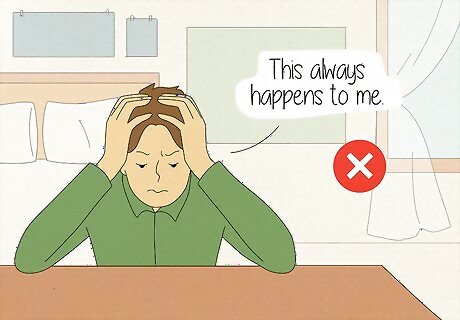
Avoid self-blame. Whether you played any role in their betrayal or not, it’s not your fault they betrayed you, and you didn’t deserve it. Still, try not to overgeneralize with statements like, “This always happens to me.” Even if it feels true, it’s not, and thinking this way can end up making you feel worse. Everyone makes mistakes, and bad things happen to everyone. Blaming yourself for everything that has occurred or believing that bad things always happen to you may make it harder for you to move forward.
Vent to someone you trust.
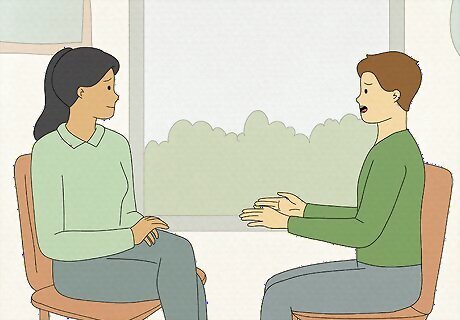
Talk to someone to get a fresh perspective. Choose a person whom you trust to talk to about the betrayal. You may want to choose a person who is far removed from the situation to avoid bias or any further conflicts among friends. Venting can help you release your negative emotions about the situation and maybe get some outside perspective. Consider talking to another friend or a trusted family member, journaling about the situation, or maybe even speaking to a counselor about what you’re going through.
Reframe the situation.

Thinking about the incident from another angle may help you heal from it. You may be swimming in self-doubt or self-blame, or you might be dwelling in negative thoughts about your friend or your worth. This is understandable. Trying to reframe the incident can help you accept what happened and alleviate any guilt or shame you feel about it. Reframing may also help you work toward healing. For instance, instead of thinking that it's all your fault that your friend betrayed you, try to practice self-compassion: maybe you made a mistake, or maybe you trusted the wrong person. You made the best decision that you could at the time, and if you could choose again, you would do it differently.
Get some physical activity.
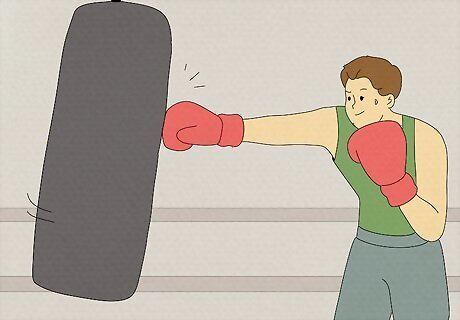
Exercise can help you process difficult emotions. Venting isn’t the only way to feel better: go on a walk or a run to release some of those negative feelings and maybe even come to some sort of decision about how to move forward. Exercise can help improve emotional regulation as well as make you feel calmer. If you play a sport, play with friends or kick a ball around. Boxing, kickboxing, and even yoga all can be helpful ways to get your stress out of your body.
Ask yourself if it was a misunderstanding.

Consider if they didn’t mean to betray you. It's easy to get upset when you think that someone close to you has betrayed your trust. That being said, it may be worth it to pause and reflect on what happened to be sure that a betrayal has actually taken place. Maybe it was an accident, or your friend didn't realize they had done something wrong. It’s not easy to do, but ask yourself if you could have made an assumption that led to a misunderstanding. If you don’t have all the details, try to get a full picture by asking third parties who may know more about what happened for information. Consider all the information, including your own. If your friend really has done something wrong, have they admitted wrongdoing? Not all guilty people confess, so consider all the evidence, and make a decision about what to do next if a betrayal has occurred. Consider how your friend feels: if they are just as upset as you are, it’s possible the betrayal was a misunderstanding or an accident on their part.
Avoid retaliating.
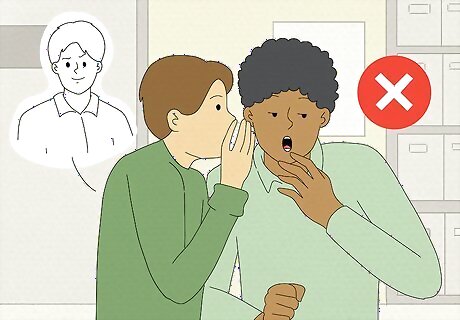
Getting revenge may be tempting, but it won't help you heal. After being hurt by your friend, your impulse might be to hurt them back, maybe by gossiping about them to others or hurling insults at them. Try to pause and take some space to cool down: retaliation may feel good in the moment, but it'll likely make you feel worse in the long run. Even if it doesn't, it's likely to keep you stuck in a cycle of drama with this friend that's sure to make you both miserable. Seeking revenge may also make it harder for you and your friend to repair your relationship, if you think you may want to try to stay friends.
Reconsider your standards for friendship.
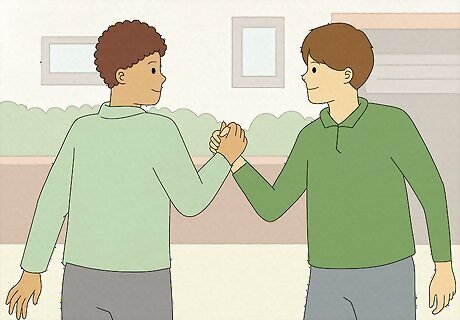
Think about what you look for and expect from your friends. Now is a good time to assess what true friendship looks like to you, both in your current friendships and moving forward. What do you look for in your friends? What do you value in your current relationships? This may help you become more discerning in future friendships. You may value specific traits, like trustworthiness, honesty, or kindness, as well as specific characteristics, like a sense of humor or a shared taste in music. As you heal from and reflect on what happened with this particular friend, dedicate time to your other relationships. They may help you move forward and remind you you deserve friends you can rely on.
Consider forgiving your friend.
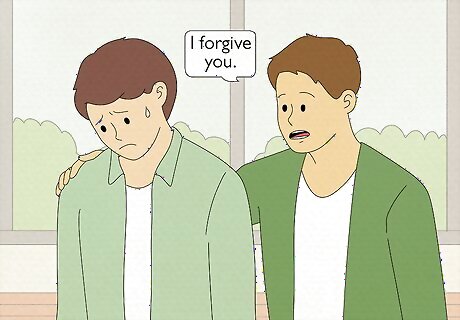
Even if you don’t stay friends, forgiveness may help you heal. You may or may not receive an apology from the person who has betrayed you. Either way, forgiving them may make it easier to move on. Consider forgiving your friend as a gift to yourself, not as a gift to the friend who betrayed you. If you forgive, you can let the incident go and move on, even if you and your friend don’t patch things up. Without forgiving, it’s easier to hold a grudge, and months or years later you might still be mad as if the incident just occurred. Ideally, the friend who betrayed you should offer an apology. However, many times there is no apology, or there’s an insincere apology. So, you may have to work through the forgiveness stage on your own. Once you forgive, try not to think about it over and over and over again. One way to catch yourself and stop yourself from thinking about it is to wear a rubber band on your wrist. Snap the band every time that you think about it.
Reassess your boundaries if you want to stay friends.
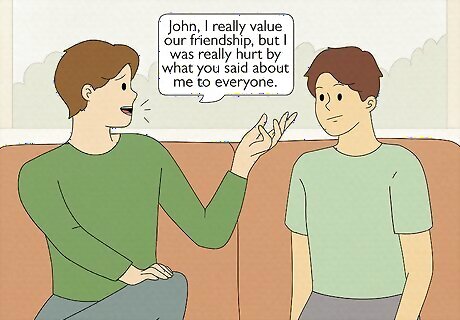
Let them know what you will and won't tolerate. Different factors, like the severity of the betrayal and the nature of your friendship, will likely dictate whether or not it's worth it to you to stay friends with this person. If you want to stay friends, it's probably necessary to re-communicate your boundaries with them or establish entirely new boundaries as you relearn to trust them. Make sure they understand that you were hurt by what they did, but you have forgiven them. “Julia, I really value our friendship, but I was really hurt by what you said about me to everyone. If you have a problem with me, I wish you’d come to me instead of talking about me behind my back. I still want to be friends, but I just don’t want this to happen again.” Repairing your friendship doesn't have to mean things go back to the way they were: if you feel like you can't trust them as much as you used to, you may decide to consider them an acquaintance instead of a friend.
End the friendship if you can't get past what happened.

Sometimes friendships aren't salvageable after a betrayal, and that's OK. If you feel like your friend's betrayal was too big to overlook, it might be hard to imagine ever really being friends with them again. That's totally understandable. In some instances, it may be reasonable to simply avoid them, but if you can, try to let them know directly that you don't wish to see them anymore, and that it's because of what happened between you. If their betrayal was a major one, the idea of seeing or talking to them may make you feel uncomfortable or unsafe; if you prefer to just avoid them, that's a valid choice. You may talk to them in person, or you might choose to send a text or e-mail letting them know your decision: “Josh, it really hurt when you shared my secret with everyone, and I just don’t think we can move past it. I don’t want to see you anymore.” “Paul, I’ve been thinking about it a lot, and I can’t get over the fact that you lied to me. I don’t want to be friends anymore.”
Try to learn from what happened.

Think of the event as a life lesson. Now you know the signs and symptoms of a betrayal, and you can pinpoint them in the future. This may keep you from making the same mistake again, or possibly from being betrayed again. Of course, you can’t control if someone betrays you, but you can control how you will deal with it if it happens. Most importantly, you know that you can overcome it.












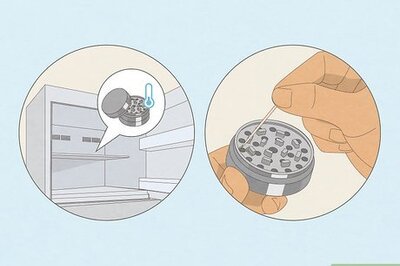







Comments
0 comment